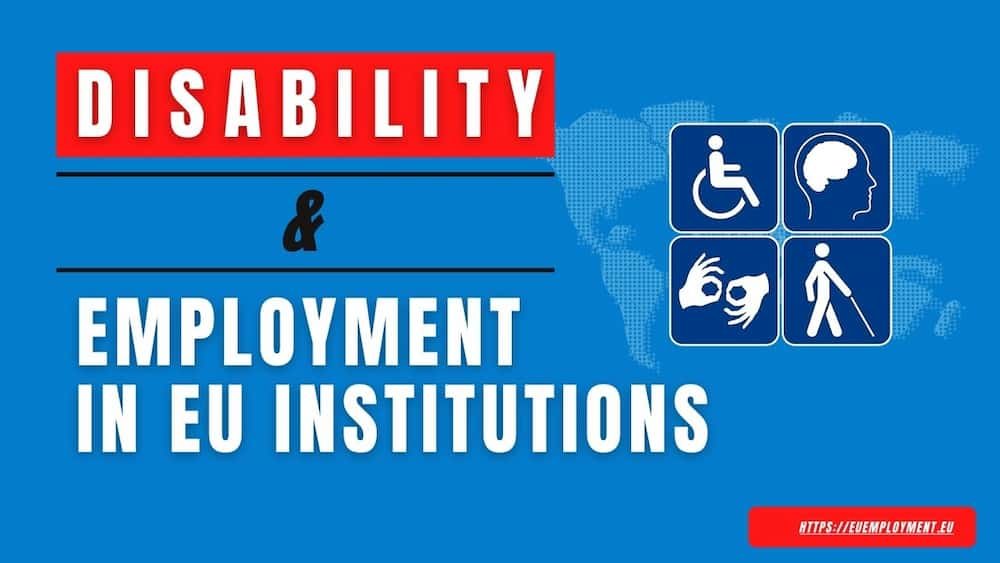According to a 2021 survey, 4.4% of European Commission and EEAS staff have reported that they have a disability, and another 6.4% respondents indicated that they care for a family member with a disability. If you are a member of the above group, this article might help you to evaluate whether to apply for a job at an EU institution.
Why to work for EU institutions?
The European Commission, the European Parliament, EU agencies and other institutions of the European Union are one of the best possible employers for you if you are a person:
- with a disability or
- with a disabled child, or
- with another dependent person who has a disability (spouse, parent, etc.),
Read this article to find out why!
EPSO and disability
The European Personnel Selection Office (EPSO) is increasingly encouraging persons with any kind of disability to apply for jobs at EU institutions. This is because of two reasons – respect for human rights, but also to attract the most qualified professionals to careers in EU institutions.
What level of disability is accepted by EU institutions?
The Staff Regulation defines disability as “long-term physical, mental, intellectual or sensory impairment which, in interaction with various barriers, may hinder his full and effective participation in society on an equal basis with others.”
The type of disability acceptable for a vacancy depends on the particular job. The main principle is that a person is supposed to be able to perform the required tasks with “reasonable accommodation”. For example, if you have a physical handicap, you might not qualify as a security guard or building maintenance, but you would be fully eligible for most office “white collar” jobs. If you have a hearing aid, you might not be a sound technician at the European Parliament but might again work at most other jobs.
What is meant by ‘reasonable accommodation’
“Reasonable accommodation” is understood as any measure to accommodate a disabled person that are not imposing a disproportionate burden on the employer. This is usually understood as adjusting the working space, however, the Staff Regulation gives the employers much more flexibility beyond this. Here are some examples of what might constitute ‘reasonable accommodation’:
- Accessible premises: main entrances, doors, doorsteps, lavatories, canteens, etc.
- Appropriate workspace: adjustable height table, appropriate seating, etc.
- ICT measures: appropriate hardware (keyboards, mice) and software (screen readers, ability to adjust screen contrast and colour scheme, policy that allows installing necessary software, etc.).
- Working time adjustments: possibility to work part-time, irregular hours, extra breaks, taking time for medical visits, etc.
- Availability of leave due to medical reasons.
- Other accommodations: employer-financed taxi/transportation services to/from work, business class air travel during missions.
This is not an exclusive list of reasonable accommodation measures. An EU institution’s management can often take a decision to make adjustments required by an individual employee.
European Commission medical examination
Article 28 of the Staff Conditions requires, among other things, the candidate is physically fit to perform his/her duties. This fitness is evaluated during a “medical examination” mentioned in Article 33.
Read the complete article on the European Commission medical examination, however, below are the main relevant points.
You should disclose all relevant health information during the medical examination. The point of the medical examination is not to disqualify you from competition for a particular vacancy, but to assess whether you are able to perform the required tasks and what accommodations are necessary for you to be able to effectively work.
During the European Commission medical examination, it will also be established if you have any “serious illness”. If such illnesses are established, this will entitle you to reimbursement of some healthcare services and medicines at a 100% rate instead of the regular 80-85% rate from JSIS, the European Commission healthcare insurance scheme for employees of EU institutions.
One major disadvantage of having a prior disability or a similar health condition when qualifying for a job in EU institutions is that it might restrict your eligibility to some social security benefits for five years from the initial employment date. The following benefits might be affected:
- Insurance against the risk of death and of invalidity occurring during employment
- Entitlement to an early pension due to an occupational safety hazard
- Survivor’s pension for one’s spouse and orphan’s pension for a child
In practical terms this means that if you will die during the first five years of employment at an EU institution and a causal link will be established with your prior serious health condition, your family might not be entitled to a rather generous social security payment and a survivor’s pension for spouse and/or underage children.
Also, if your prior disability gets worse during the first five years of employment, the EU institution you’re employed at will not bear the same responsibility as it would for employees without a pre-existing disability at the date of initial employment.
Parents of children with disabilities and JSIS
A career in any EU institution can be a great financial support to any parent with a disabled child or other dependent relative. This is because all dependent family members are automatically covered by JSIS.
From the first day of your employment, you and your dependents can get 80-85% of most healthcare costs and medicines reimbursed. In case of a “serious illness”, also one related to a pre-existing disability or a similar serious health condition, healthcare services and medicines related to treating this condition are reimbursed at a 100% rate.
At the time of the selection procedure and during the medical examination you are neither asked, nor required to disclose information about the state of health of your family members.
Conclusion
I would like to add from my own experience that the above is not just a theoretical description. While I don’t know of many former colleagues with disabilities, I had one colleague with quite a severe physical disability. It was excellent to observe how management of the institution had a tailored plan to accommodate the person’s needs so that the colleague could contribute to our common work at full capacity.
I would like to fully endorse that any person with a disability considers a career in an EU institution that’s the best fit to their interests and skillset.
Legal excerpts
Relevant articles from the Staff Regulations:
- DEFINITIONS OF DISABILITY AND REASONABLE ACCOMODATION | Article 1c:
- […] a person has a disability if he has a long-term physical, mental, intellectual or sensory impairment which, in interaction with various barriers, may hinder his full and effective participation in society on an equal basis with others.
- A person with a disability meets the conditions laid down in point (e) of Article 28 [being ‘fit for service’] if he can perform the essential functions of the job when reasonable accommodation is made. ‘Reasonable accommodation’, in relation to the essential functions of the job, shall mean appropriate measures, where needed, to enable a person with a disability to have access to, participate in, or advance in employment, or to undergo training, unless such measures would impose a disproportionate burden on the employer.
- [Affirmative action is allowed] The principle of equal treatment shall not prevent the appointing authorities of the institutions from maintaining or adopting measures providing for specific advantages in order to make it easier for persons with disabilities to pursue a vocational activity or in order to prevent or compensate for disadvantages in their professional careers.
- BIRTH- OR ADOPTION-RELATED LEAVE | Article 6:
- Birth of a disabled or seriously ill child: 20 days, to be taken during the 14 weeks following the birth;
- Adoption of a child: 20 weeks, rising to 24 weeks in the case of the adoption of a disabled child.
- EUROPEAN COMMISSION MEDICAL EXAMINATION | Article 33:
- Before appointment, a successful candidate shall be medically examined by one of the institution’s medical officers in order that the institution may be satisfied that he fulfils the requirements of Article 28 (e) [be physically fit to perform duties].
- Where a negative medical opinion is given as a result of the medical examination provided for in the first paragraph, the candidate may, within 20 days of being notified of this opinion by the institution, request that his case be submitted for the opinion of a medical committee composed of three doctors chosen by the appointing authority from among the institutions’ medical officers. The medical officer responsible for the initial negative opinion shall be heard by the medical committee. The candidate may refer the opinion of a doctor of his choice to the medical committee. Where the opinion of the medical committee confirms the conclusions of the medical examination provided for in the first paragraph, the candidate shall pay 50 % of the fees and of the incidental costs.
- SPECIAL LEAVE TO CARE FOR A DEPENDENT RELATIVE | Article 40:
- the leave [to care for a disabled dependent] may be extended without limits, provided that, at the time of each extension, the conditions which warranted the grant of the leave continue to be fulfilled [this applies to caring for child considered as a dependant, to assist his spouse, a relative in the ascending line, a relative in the descending line, or to assist a brother or a sister in the case of medically certified serious illness or disability].
- PARENTAL LEAVE | Article 42a:
- An official shall be entitled to up to six months of parental leave without basic salary for every child, to be taken during the first twelve years after the birth or adoption of the child. The duration of the leave may be doubled for single parents recognised under general implementing provisions adopted by the appointing authority of each institution and for parents of dependent children with a disability or a severe illness recognised by the institution’s medical officer. The minimum leave taken at any one time shall not be less than one month.
- PART TIME WORK | Article 55a:
- An official may request authorisation to work part time. The Appointing Authority may grant such authorisation if this is compatible with the interests of the service. The official shall be entitled to authorisation in the following cases: (e) to care for a seriously ill or disabled spouse, relative in the ascending line, relative in the descending line, brother or sister. Where such entitlement to authorisation is exercised to care for a seriously ill or disabled spouse, relative in the ascending line, relative in the descending line, brother or sister, or to take part in further training, the total of all such periods shall not exceed five years over the official’s career.
- CHILD ALLOWANCE | Article 67:
- The dependent child allowance may be doubled, by special reasoned decision of the appointing authority based on medical documents establishing that the child concerned has a disability or a long-term illness which involves the official in heavy expenditure.
- PENSIONS | Article 76a:
- A surviving spouse who has a serious or protracted illness or who is disabled may receive financial aid increasing the pension from the appointing authorities of the institutions for the duration of the illness or disability on the basis of an examination of the social and medical circumstances of the person concerned. Rules implementing this Article shall be fixed by common accord between the institutions, after consulting the Staff Regulations Committee.
Video: (c) epso.europa.eu







3 responses to “Disability and employment in EU institutions”
Would a previous diagnosed and cured cancer diagnosis be cuas disability? And if recurrence happens in the first 5 years, what would that mean?
Hi,
Thanks for the insights.
May I ask what allowances or benefits are provided for an officer whose legal partner/spouse has a certified disability?
Dears. The article is really interesting but it doesnt include much info about mental handicaps or psychological disorders. This is quite common nowadays. Even though its a case by case analyses, in principle, do you consider that an autistic person or bipolar disorder person could be able/fit to work in the EU institutions? Obviously proving that the person is being correctly treated medically.
Thank you very much!